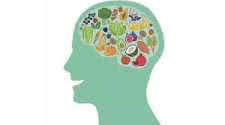Do Carbs and Fats have any Effects on Moods, Alertness and Pain?

Understanding the Pros and Cons of the Foods you Eat is Essential
What we eat influences how we act and feel. Besides supplying the vital energy and nutrients essential to life, food helps to
regulate behavior by the way it affects certain chemicals active in the nervous system. These behaviors range from mental
alertness to pain perception.
These effects are illustrated in two recent studies that involved human volunteers. The first, published in Physiology and
Behavior (61:679-86, 1997), included nine men and " nine women, divided into two dieting groups: high-fat, low-carb and low-fat,
high-carb. The study examined the effects of either high-carb or low-carb meals on sleepiness, mood and hormonal levels.
As expected, those consuming the high-carb diet showed increased insulin levels. Insulin is known to induce drowsiness,
explaining why you may feel sleepy after a meal containing a high sugar content. The study further showed that high-fat meals
stimulate the release of a hormone called cholecystokinin (CCK) produced both in the gut and the brain. In the gut, CCK
promotes gallbladder contraction, which releases bile. The bile is needed to emulsify large fat particles into smaller
particles, making it easier for fat-digesting enzymes (lipases) to work.
What CCK does in the brain is still a mystery. Some studies show that it suppresses appetite; other research indicates it has
a sedative effect, which may be induced by a CCK-mediated release of a brain hormone called oxytocin. Oxytocin is involved in
sexual orgasms and the subsequent bonding effect that often occurs in a woman after a sexual act, but its main job is to
stimulate uterine contraction during childbirth.
The sedative action of oxytocin may relate to its promoting a vagal-nerve response, which can induce sleepiness. That may be
what happened to the subjects in the high-fat group. Within two or three hours of consuming a high-fat, low-carb meal, these
people reported feeling less alert. In contrast, those eating the low-fat, high-carb meal felt more alert after the same time
period.
This finding departs from the common dogma that says eating a high amount of carbs makes you feel tired.
The reason usually given for this effect is that high-carb meals promote the secretion of a brain chemical called serotonin,
which is known to increase fatigue.
Another inquiry, also published in Physiology and Behavior (62:185-91,1997), looks at the ramifications of diet on pain. This
study involved eight men and eight women who consumed either high-fat, low-carb meals or low-fat, high-carb meals, then were
subjected to a standard pain perception test called the cold pressor test.
The low-carb, high-fat diet proved to be superior to the high-carb, low-fat plan in diminishing the feeling of pain. Once again,
the effect was thought to be due to the promotion of CCK from the high-fat intake. The maximum pain reduction occurred an hour
and a half after the ingestion of the high-fat, low-carb meal.
How does CCK decrease the feeling of pain? The theory is that CCK turns on natural pain-buffering substances, such as endorphins
and enkephalins, in the opioid pathways of the brain. Athletes who use synthetic morphinelike drugs such as Nubain to increase
pain tolerance during intense workouts may do well to increase their fat intake instead. A high-fat, low-carb diet may provide
the unexpected bonus of raising workout intensity through an increase in the perceived pain threshold. This idea, however,
awaits further study with an athletically experienced population.